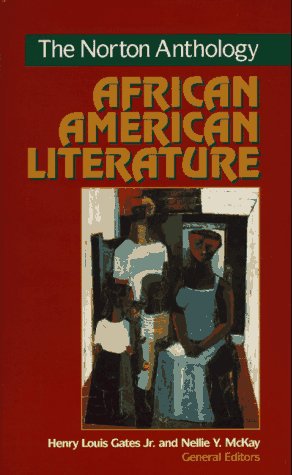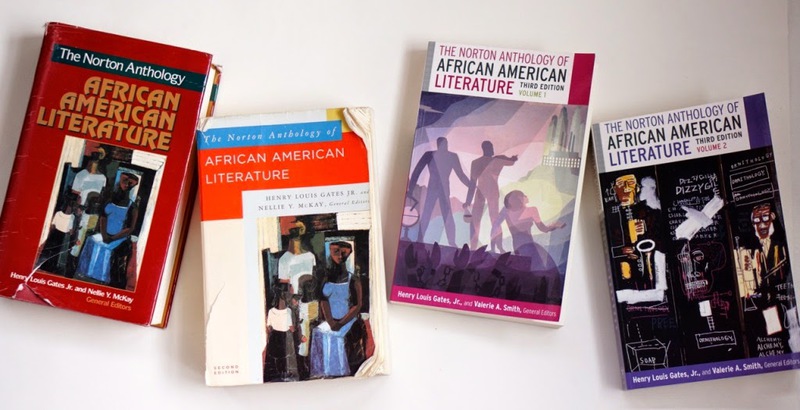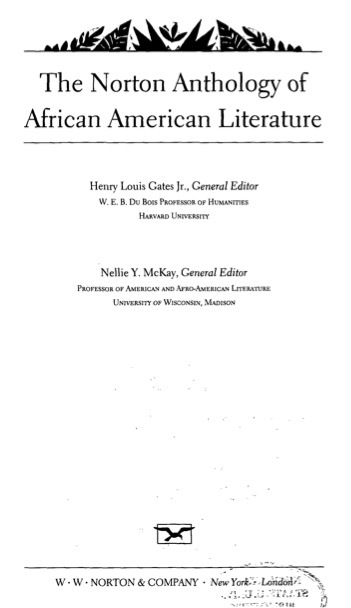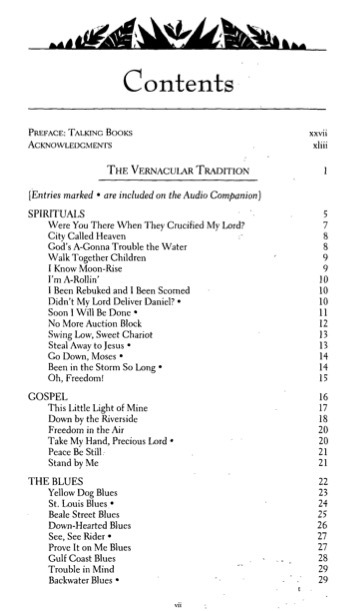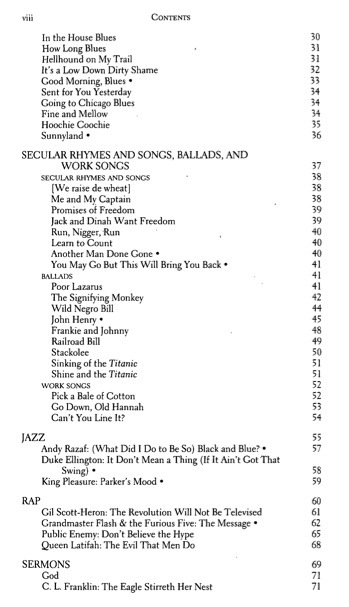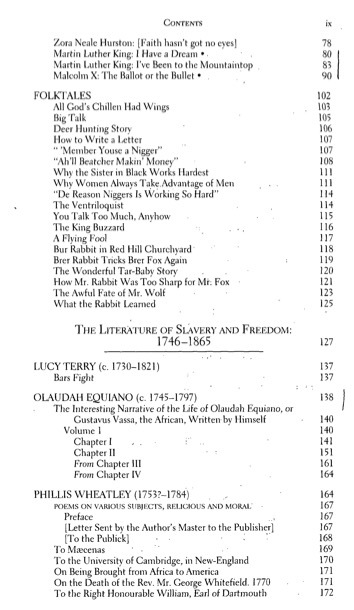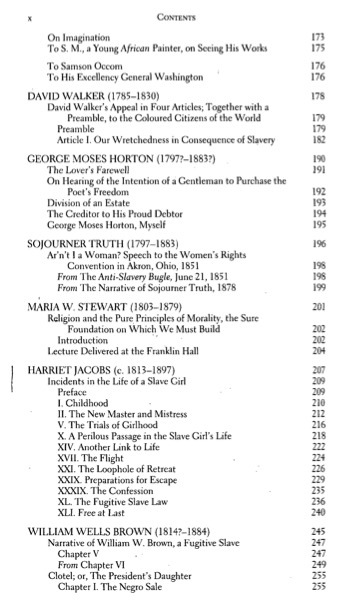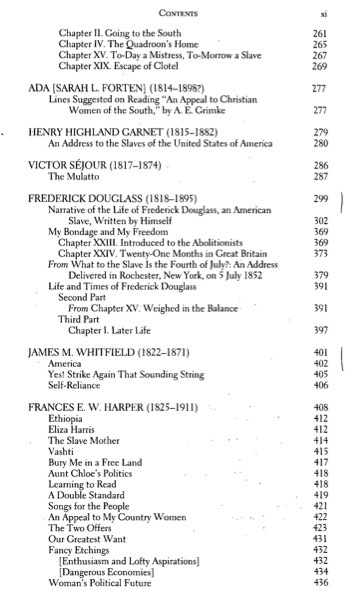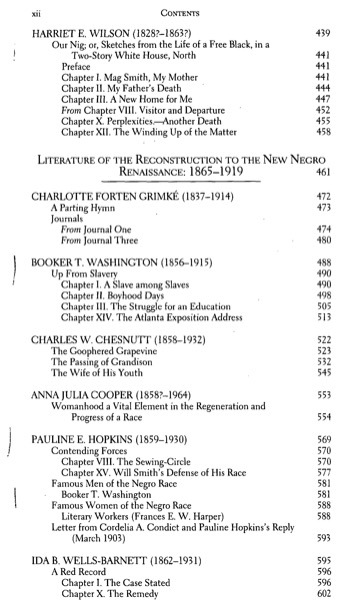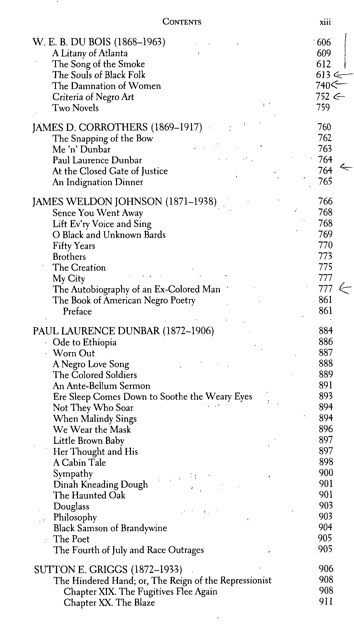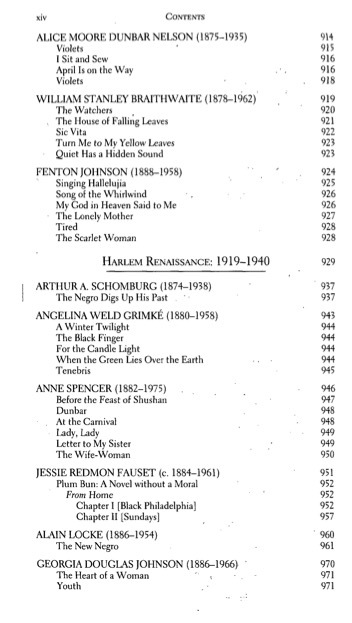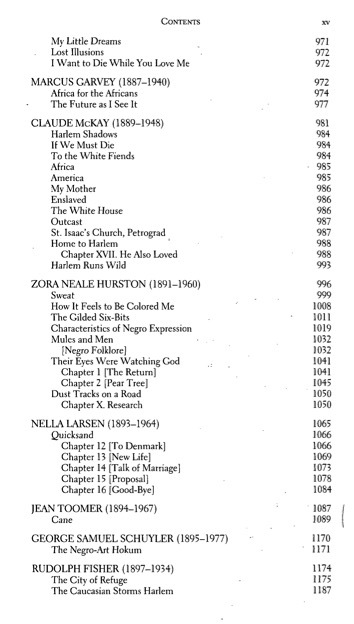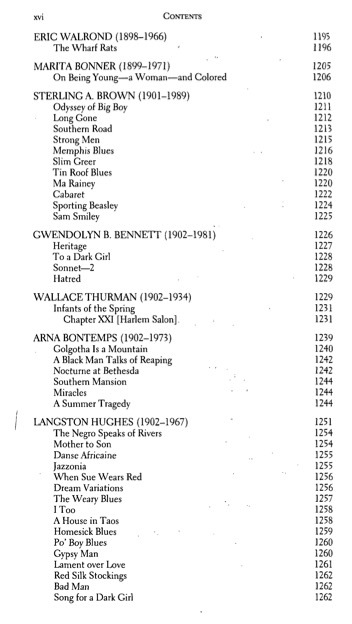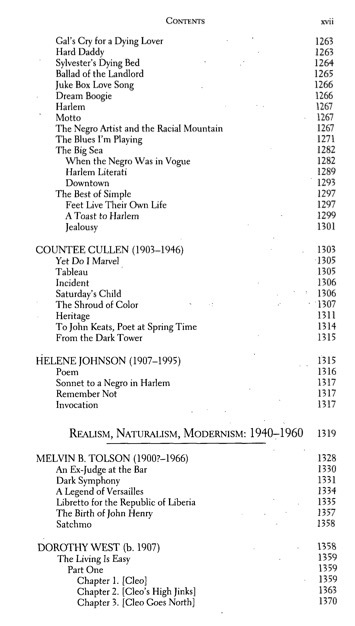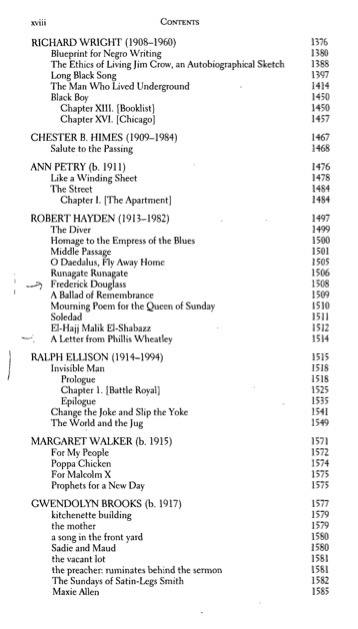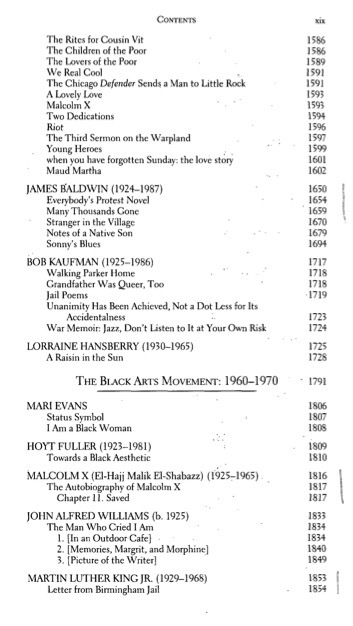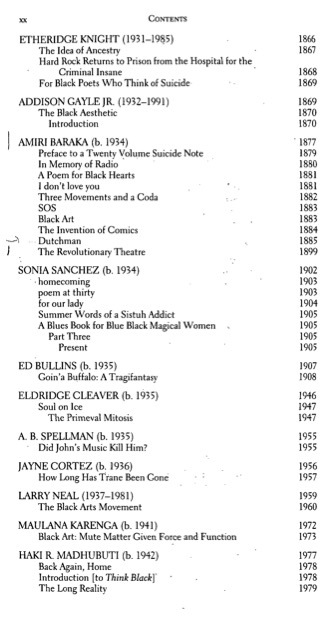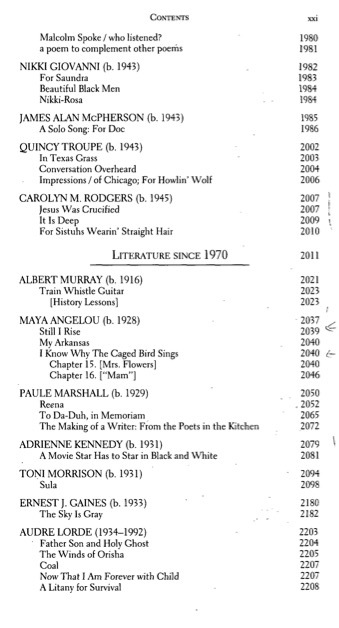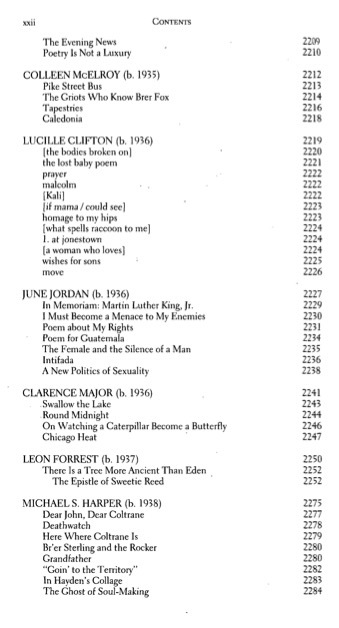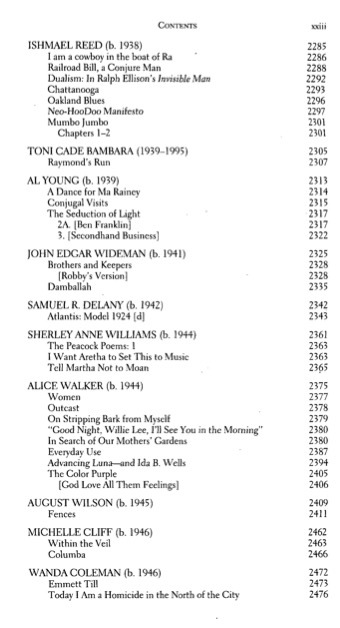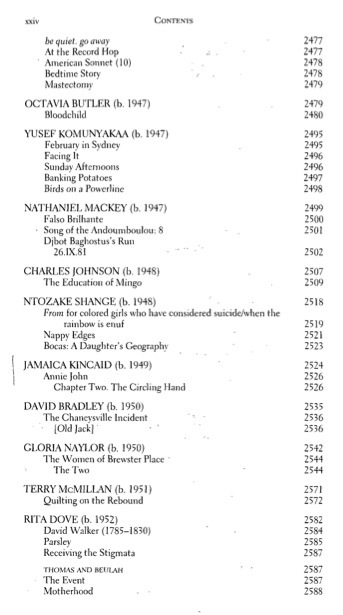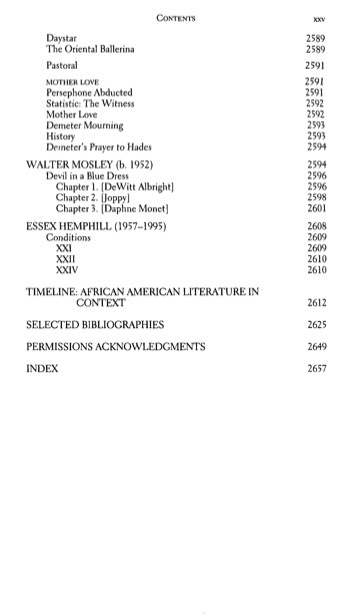-
Title
-
Norton Anthology of African American Literature
-
This edition
-
"The Norton Anthology of African American Literature" . Gen. ed. Henry Louis Gates, Jr. and Nellie Y. McKay. New York: Norton, 1996. xliv+2,665 pp. + CD disc (comp. Robert G. O'Meally).
-
Table of contents
-
Contents (1996, first ed.):
• Henry Louis Gates, Jr. and Nellie Y. McKay / Preface: Talking Books
Acknowledgments
The Vernacular Tradition
• [Introduction:] The Vernacular Tradition
Spirituals:
• Anon. / Were You There When They Crucified My Lord?
• Anon. / City Called Heaven
• Anon. / God's A-Gonna Trouble the Water
• Anon. / Walk Together Children
• Anon. / I Know Moon-Rise
• Anon. / I'm A-Rollin'
• Anon. / I Been Rebuked and I Been Scorned
• Anon. / Didn't My Lord Deliver Daniel?
• Anon. / Soon I Will Be Done
• Anon. / No More Auction Block
• Anon. / Swing Low, Sweet Chariot
• Anon. / Steal Away to Jesus
• Anon. / Go Down, Moses
• Anon. / Been in the Storm So Long
• Anon. / Oh, Freedom!
Gospel:
• Anon. / This Little Light of Mine
• Anon. / Down by the Riverside
• Anon. / Freedom in the Air
• Anon. / Take My Hand, Precious Lord
• Anon. / Peace Be Still
• Anon. / Stand by Me
The Blues:
• Anon. / Yellow Dog Blues
• Anon. / St. Louis Blues
• Anon. / Beale Street Blues
• Anon. / Down-Hearted Blues
• Anon. / See, See Rider
• Anon. / Prove It on Me Blues
• Anon. / Gulf Coast Blues
• Anon. / Trouble in Mind
• Anon. / Backwater Blues
• Anon. / In the House Blues
• Anon. / How Long Blues
• Anon. / Hellhound on My Trail
• Anon. / It's a Low Down Dirty Shame
• Anon. / Good Morning, Blues
• Anon. / Sent for You Yesterday
• Anon. / Going to Chicago Blues
• Anon. / Fine and Mellow
• Anon. / Hoochie Coochie
• Anon. / Sunnyland
Secular Rhymes and Songs, Ballads, and Work Songs.
Secular Rhymes and Songs:
• Anon. / [We raise de wheat]
• Anon. / Me and My Captain
• Anon. / Promises of Freedom
• Anon. / Jack and Dinah Want Freedom
• Anon. / Run, Nigger, Run
• Anon. / Learn to Count
• Anon. / Another Man Done Gone
• Anon. / You May Go But This Will Bring You Back
Ballads:
• Anon. / Poor Lazarus
• Anon. / The Signifying Monkey
• Anon. / Wild Negro Bill
• Anon. / John Henry
• Anon. / Frankie and Johnny
• Anon. / Railroad Bill
• Anon. / Stackolee
• Anon. / Sinking of the 'Titanic'
• Anon. / Shine and the 'Titanic'
Work Songs:
• Anon. / Pick a Bale of Cotton
• Anon. / Go Down, Old Hannah
• Anon. / Can't You Line It?
Jazz:
• Andy Razaf / (What Did I Do to Be So) Black and Blue
• Duke Ellington / It Don't Mean a Thing (If It Ain't Got That Swing)
• King Pleasure / Parker's Mood
Rap:
• Gil Scott-Heron / The Revolution Will Not Be Televised
• Grandmaster Flash & The Furious Five / The Message
• Public Enemy / Don't Believe the Hype
• Queen Latifah / The Evil That Men Do
Sermons:
• Anon. / God
• C. L. Franklin / The Eagle Stirreth Her Nest
• Zora Neale Hurston / Faith Hasn't Got No Eyes
• Martin Luther King, Jr. / I Have a Dream
• Martin Luther King, Jr. / I've Been to the Mountaintop
• Malcolm X / The Ballot or the Bullet
Folktales:
• Anon. / All God's Chillen Had Wings
• Anon. / Big Talk
• Anon. / Deer Hunting Story
• Anon. / How to Write a Letter
• Anon. / "'Member youse a nigger"
• Anon. / "Ah'll beatcher makin' money"
• Anon. / Why the Sister in Black Works Hardest
• Anon. / Why Women Always Take Advantage of Men
• Anon. / "De reason niggers is working so hard"
• Anon. / The Ventriloquist
• Anon. / You Talk Too Much, Anyhow
• Anon. / The King Buzzard
• Anon. / A Flying Fool
• Anon. / Bur Rabbit in Red Hill Churchyard
• Anon. / Brer Rabbit Tricks Brer Fox Again
• Anon. / The Wonderful Tar-Baby Story
• Anon. / How Mr. Rabbit Was Too Sharp for Mr. Fox
• Anon. / The Awful Fate of Mr. Wolf
• Anon. / What the Rabbit Learned
The Literature of Slavery and Freedom : 1746-1865.
• [Introduction]: The Literature of Slavery and Freedom: 1746-1865
• Lucy Terry / Bars Fight
• Olaudah Equiano / The Interesting Narrative of the Life of Olaudah Equiano, or, Gustavus Vassa, the African, Written by Himself: excerpts: Volume 1. Chapter I ; Chapter II ; from Chapter III ; from Chapter IV
• Phillis Wheatley / Poems on Various Subjects, Religious and Mora: front matter: Preface; [Letter Sent by the Author's Master to the Publisher]; [To the Publick]
• Phillis Wheatley / To Mæcenas
• Phillis Wheatley / To the University of Cambridge, in New-England
• Phillis Wheatley / On Being Brought from Africa to America
• Phillis Wheatley / On the Death of the Rev. Mr. George Whitefield, 1770
• Phillis Wheatley / To the Right Honourable William, Earl of Dartmouth
• Phillis Wheatley / On Imagination
• Phillis Wheatley / To S.M., a Young African Painter, on Seeing His Works
• Phillis Wheatley / To Samson Occom
• Phillis Wheatley / To His Excellency General Washington
• David Walker / David Walker's Appeal in Four Articles; Together with a Preamble, to the Coloured Citizens of the World: excerpts: Preamble; Article I : Our Wretchedness in Consequence of Slavery
• George Moses Horton / The Lover's Farewell
• George Moses Horton / On Hearing of the Intention of a Gentleman to Purchase the Poet's Freedom
• George Moses Horton / Division of an Estate
• George Moses Horton / The Creditor to His Proud Debtor
• George Moses Horton / George Moses Horton, Myself
• Sojourner Truth / Ar'n't I a Woman? Speech to the Women's Rights Convention in Akron, Ohio, 1851: version from The "Anti-Slavery Bugle", June 21, 1851
• Sojourner Truth / Ar'n't I a Woman? Speech to the Women's Rights Convention in Akron, Ohio, 1851: version from The Narrative of Sojourner Truth, 1878
• Maria W. Stewart / Religion and the Pure Principles of Morality, the Sure Foundation on Which We Must Build: excerpt: Introduction
• Maria W. Stewart / Lecture Delivered at the Franklin Hall
• Harriet Jacobs / Incidents in the Life of a Slave Girl: excerpts: Preface; I. Childhood; II. The New Master and Mistress; V. The Trials of Girlhood; X. A Perilous Passage in the Slave Girl's Life; XIV. Another Link to Life; XVII: The Flight; XXI. The Loophole of Retreat; XXIX. Preparations for Escape; XXXIX. The Confession; XL. The Fugitive Slave Law; XLI. Free at Last
• William Wells Brown / Narrative of William W. Brown, a Fugitive Slave: excerpts: Chapter V; from Chapter VI
• William Wells Brown / Clotel, or, The President's Daughter: excerpts: Chapter 1. The Negro Sale; Chapter II. Going to the South; Chapter IV. The Quadroon's Home; Chapter XV. To-day a Mistress, Tomorrow a Slave; Chapter XIX. Escape of Clotel
• Ada [Sarah L. Forten] / Lines Suggested on Reading "An appeal to Christian Women of the South," by A. E. Grimke
• Henry Highland Garnet / An Address to the Slaves of the United States of America
• Victor Séjour / The Mulatto
• Frederick Douglass / Narrative of the Life of Frederick Douglass, an American Slave, Written by Himself
• Frederick Douglass / My Bondage and My Freedom: excerpts: Chapter XXIII. Introduced to the Abolitionists; Chapter XXIV. Twenty-one Months in Great Britain
• Frederick Douglass / What to the Slave Is the Fourth of July? : An Address Delivered in Rochester, New York, on 5 July 1852: excerpt
• Frederick Douglass / Life and Times of Frederick Douglass: excerpts: Second Part: from Chapter XV : Weighed in the Balance; Third Part: Chapter I. Later Life
• James M. Whitfield / America
• James M. Whitfield / Yes! Strike Again That Sounding String
• James M. Whitfield / Self-Reliance
• Frances E. W. Harper / Ethiopia
• Frances E. W. Harper / Eliza Harris
• Frances E. W. Harper / The Slave Mother
• Frances E. W. Harper / Vashti
• Frances E. W. Harper / Bury Me in a Free Land
• Frances E. W. Harper / Aunt Chloe's Politics
• Frances E. W. Harper / Learning to Read
• Frances E. W. Harper / A Double Standar
• Frances E. W. Harper / Songs for the People
• Frances E. W. Harper / An Appeal to My Country Women
• Frances E. W. Harper / The Two Offers
• Frances E. W. Harper / Our Greatest Want
• Frances E. W. Harper / Fancy Etchings: [Enthusiasm and Lofty Aspirations]
• Frances E. W. Harper / Fancy Etchings: [Dangerous Economies ]
• Frances E. W. Harper / Woman's Political Future
• Harriet E. Wilson / Our Nig, or, Sketches from the Life of a Free Black, in a Two-Story White House, North: excerpts: Preface; Chapter I. Mag Smith, My Mother; Chapter II. My Father's Death; Chapter III. A New Home for Me; from Chapter VIII. Visitor and Departure; Chapter X. Perplexities--Another Death; Chapter XII. The Winding Up of the Matter
Literature of the Reconstruction to the New Negro Renaissance: 1865-1919
• [Introduction]: Literature of the Reconstruction to the New Negro Renaissance 1865-1919
• Charlotte Forten Grimké / A Parting Hymn
• Charlotte Forten Grimké / Journals: excerpts: from Journal One; from Journal Three
• Booker T. Washington / Up from Slavery: excerpts: Chapter I. A Slave among Slaves; Chapter II. Boyhood Days; Chapter III. The Struggle for an Education; Chapter XIV. The Atlanta Exposition Address
• Charles W. Chesnutt / The Goopherd Grapevine
• Charles W. Chesnutt / The Passing of Grandison
• Charles W. Chesnutt / The Wife of His Youth
• Anna Julia Cooper / Womanhood a Vital Element in the Regeneration and Progress of a Race
• Pauline E. Hopkins / Contending Forces: excerpts: Chapter VIII. The Sewing-Circle; Chapter XV. Will Smith's Defense of His Race
• Pauline E. Hopkins / Famous Men of the Negro Race: excerpt: Booker T. Washington
• Pauline E. Hopkins / Famous Women of the Negro Race: excerpt: Literary Workers (Frances E. W. Harper)
• Pauline E. Hopkins / Letter from Cordelia A. Condict and Pauline Hopkins's Reply (March 1903)
• Ida B. Wells-Barnett / A Red Record: excerpts: Chapter I. The Case Stated; Chapter X. The Remedy
• W. E. B. Du Bois / A Litany of Atlanta
• W. E. B. Du Bois / The Song of the Smoke
• W. E. B. Du Bois / The Souls of Black Folk
• W. E. B. Du Bois / The Damnation of Women
• W. E. B. Du Bois / Criteria of Negro Art
• W. E. B. Du Bois / Two Novels
• James D. Corrothers / The Snapping of the Bow
• James D. Corrothers / Me 'n' Dunbar
• James D. Corrothers / Paul Laurence Dunbar
• James D. Corrothers / At the Closed Gate of Justice
• James D. Corrothers / An Indignation Dinner
• James Weldon Johnson / Sence You Went Away
• James Weldon Johnson / Lift Ev'ry Voice and Sing
• James Weldon Johnson / O Black and Unknown Bards
• James Weldon Johnson / Fifty Years
• James Weldon Johnson / Brothers
• James Weldon Johnson / The Creation
• James Weldon Johnson / My City
• James Weldon Johnson / The Autobiography of an Ex-Colored Man
• James Weldon Johnson / The Book of American Negro Poetry: Preface
• Paul Laurence Dunbar / Ode to Ethiopia
• Paul Laurence Dunbar / Worn Out
• Paul Laurence Dunbar / A Negro Love Song
• Paul Laurence Dunbar / The Colored Soldiers
• Paul Laurence Dunbar / An Ante-Bellum Sermon
• Paul Laurence Dunbar / Ere Sleep Comes Down to Soothe the Weary Eyes
• Paul Laurence Dunbar / Not They Who Soar
• Paul Laurence Dunbar / When Malindy Sings
• Paul Laurence Dunbar / We Wear the Mask
• Paul Laurence Dunbar / Little Brown Baby
• Paul Laurence Dunbar / Her Thought and His
• Paul Laurence Dunbar / A Cabin Tale
• Paul Laurence Dunbar / Sympathy
• Paul Laurence Dunbar / Dinah Kneading Dough
• Paul Laurence Dunbar / The Haunted Oak
• Paul Laurence Dunbar / Douglass
• Paul Laurence Dunbar / Philosophy
• Paul Laurence Dunbar / Black Samson of Brandywine
• Paul Laurence Dunbar / The Poet
• Paul Laurence Dunbar / The Fourth of July and Race Outrages
• Sutton E. Griggs / The Hindered Hand, or, The Reign of the Repressionist: excerpts: Chapter XIX. The Fugitives Flee Again; Chapter XX. The Blaze
• Alice Moore Dunbar Nelson / Violets
• Alice Moore Dunbar Nelson / I Sit and Sew
• Alice Moore Dunbar Nelson / April Is on the Way
• Alice Moore Dunbar Nelson / Violets
• William Stanley Braithwaite / The Watchers
• William Stanley Braithwaite / The House of Falling Leaves
• William Stanley Braithwaite / Sic Vita
• William Stanley Braithwaite / Turn Me to My Yellow Leaves
• William Stanley Braithwaite / Quiet Has a Hidden Sound
• Fenton Johnson / Singing Hallelujia
• Fenton Johnson / Song of the Whirlwind
• Fenton Johnson / My God in Heaven Said to Me
• Fenton Johnson / The Lonely Mother
• Fenton Johnson / Tired
• Fenton Johnson / The Scarlet Woman
Harlem Renaissance : 1919-1940.
• [Introduction]: Harlem Renaissance, 1919-1940
• Arthur A. Schomburg / The Negro Digs up His Past
• Angelina Weld Grimké / A Winter Twilight
• Angelina Weld Grimké / The Black Finger
• Angelina Weld Grimké / For the Candle Light
• Angelina Weld Grimké / When the Green Lies over the Earth
• Angelina Weld Grimké / Tenebris
• Anne Spencer / Before the Feast of Shushan
• Anne Spencer / Dunbar
• Anne Spencer / At the Carnival
• Anne Spencer / Lady, Lady
• Anne Spencer / Letter to My Sister
• Anne Spencer / The Wife-Woman
• Jessie Redmon Fauset / Plum Bun : A Novel Without a Moral: excerpts: from Home: Chapter I [Black Philadelphia]; Chapter II [Sundays]
• Alain Locke / The New Negro
• Georgia Douglas Johnson / The Heart of a Woman
• Georgia Douglas Johnson / Youth
• Georgia Douglas Johnson / My Little Dreams
• Georgia Douglas Johnson / Lost Illusions
• Georgia Douglas Johnson / I Want to Die While You Love Me
• Marcus Garvey / Africa for the Africans
• Marcus Garvey / The Future as I See It
• Claude McKay / Harlem Shadows
• Claude McKay / If We Must Die
• Claude McKay / To the White Fiends
• Claude McKay / Africa
• Claude McKay / America
• Claude McKay / My Mother
• Claude McKay / Enslaved
• Claude McKay / The White House
• Claude McKay / Outcast
• Claude McKay / St. Isaac's Church, Petrograd
• Claude McKay / Home to Harlem: excerpt: Chapter XVII. He Also Loved
• Claude McKay / Harlem Runs Wild
• Zora Neale Hurston / Sweat
• Zora Neale Hurston / How It Feels to Be Colored Me
• Zora Neale Hurston / The Gilded Six-Bits
• Zora Neale Hurston / Characteristics of Negro Expression
• Zora Neale Hurston / Mules and Men: excerpt: [Negro Folklore]
• Zora Neale Hurston / Their Eyes Were Watching God: excerpts: Chapter 1 [The Return]; Chapter 2 [Pear Tree]
• Zora Neale Hurston / Dust Tracks on a Road: excerpt: Chapter X. Research
• Nella Larsen / Quicksand: excerpts: Chapter 12 [To Denmark]; Chapter 13 [New Life]; Chapter 14 [Talk of Marriage]; Chapter 15 [Proposal]; Chapter 16 [Good-Bye]
• Jean Toomer / Cane
• George Samuel Schuyler / The Negro-Art Hokum
• Rudolph Fisher / The City of Refuge
• Rudolph Fisher / The Caucasian Storms Harlem
• Eric Walrond / The Wharf Rats
• Marita Bonner / On Being Young, a Woman, and Colored
• Sterling A. Brown / Odyssey of Big Boy
• Sterling A. Brown / Long Gone
• Sterling A. Brown / Southern Road
• Sterling A. Brown / Strong Men
• Sterling A. Brown / Memphis Blues
• Sterling A. Brown / Slim Greer
• Sterling A. Brown / Tin Roof Blues
• Sterling A. Brown / Ma Rainey
• Sterling A. Brown / Cabaret
• Sterling A. Brown / Sporting Beasley
• Sterling A. Brown / Sam Smiley
• Gwendolyn B. Bennett / Heritage
• Gwendolyn B. Bennett / To a Dark Girl
• Gwendolyn B. Bennett / Sonnet, 2
• Gwendolyn B. Bennett / Hatred
• Wallace Thurman / Infants of the Spring: excerpt: Chapter XXI [Harlem Salon]
• Arna Bontemps / Golgotha Is a Mountain
• Arna Bontemps / A Black Man Talks of Reaping
• Arna Bontemps / Nocturne at Bethesda
• Arna Bontemps / Southern Mansion
• Arna Bontemps / Miracles
• Arna Bontemps / A Summer Tragedy
• Langston Hughes / The Negro Speaks of Rivers
• Langston Hughes / Mother to Son
• Langston Hughes / Danse Africaine
• Langston Hughes / Jazzonia
• Langston Hughes / When Sue Wears Red
• Langston Hughes / Dream Variations
• Langston Hughes / The Weary Blues
• Langston Hughes / I Too
• Langston Hughes / A House in Taos
• Langston Hughes / Homesick Blues
• Langston Hughes / Po' Boy Blues
• Langston Hughes / Gypsy Man
• Langston Hughes / Lament over Love
• Langston Hughes / Red Silk Stockings
• Langston Hughes / Bad Man
• Langston Hughes / Song for a Dark Girl
• Langston Hughes / Gal's Cry for a Dying Lover
• Langston Hughes / Hard Daddy
• Langston Hughes / Sylvester's Dying Bed
• Langston Hughes / Ballad of the Landlord
• Langston Hughes / Juke Box Love Song
• Langston Hughes / Dream Boogie
• Langston Hughes / Harlem
• Langston Hughes / Motto
• Langston Hughes / The Negro Artist and the Racial Mountain
• Langston Hughes / The Blues I'm Playing
• Langston Hughes / The Big Sea: excerpt: When the Negro Was in Vogue; Harlem Literati; Downtown
• Langston Hughes / The Best of Simple: excerpts: Feet Live Their Own Life; A Toast to Harlem; Jealousy
• Countee Cullen / Yet Do I Marvel
• Countee Cullen / Tableau
• Countee Cullen / Incident
• Countee Cullen / Saturday's Child
• Countee Cullen / The Shroud of Color
• Countee Cullen / Heritage
• Countee Cullen / To John Keats, Poet at Spring Time
• Countee Cullen / From the Dark Tower
• Helene Johnson / Poem
• Helene Johnson / Sonnet to a Negro in Harlem
• Helene Johnson / Remember Not
• Helene Johnson / Invocation
Realism, Naturalism, Modernism : 1940-1960.
• [Introduction]: Realism, Naturalism, Modernism 1940-1960
• Melvin B. Tolson / An Ex-Judge at the Bar
• Melvin B. Tolson / Dark Symphony
• Melvin B. Tolson / A Legend of Versailles
• Melvin B. Tolson / Libretto for the Republic of Liberia
• Melvin B. Tolson / The Birth of John Henry
• Melvin B. Tolson / Satchmo
• Dorothy West / The Living is Easy: excerpts: Part One: Chapter 1 [Cleo]; Chapter 2 [Cleo's High Jinks]; Chapter 3 [Cleo Goes North]
• Richard Wright / Blueprint for Negro Writing
• Richard Wright / The Ethics of Living Jim Crow, an Autobiographical Sketch
• Richard Wright / Long Black Song
• Richard Wright / The Man Who Lived Underground
• Richard Wright / Black Boy: excerpts: Chapter XIII. [Booklist]; Chapter XVI. [Chicago]
• Chester B. Himes / Salute to the Passing
• Ann Petry / Like a Winding Sheet
• Ann Petry / The Street: excerpt: Chapter 1 [The Apartment]
• Robert Hayden / The Diver
• Robert Hayden / Homage to the Empress of the Blues
• Robert Hayden / Middle Passage
• Robert Hayden / O Daedalus, Fly Away Home
• Robert Hayden / Runagate Runagate
• Robert Hayden / Frederick Douglass
• Robert Hayden / A Ballad of Remembrance
• Robert Hayden / Mourning Poem for the Queen of Sunday
• Robert Hayden / Soledad
• Robert Hayden / El-Hajj Malik El-Shabazz
• Robert Hayden / A Letter from Phillis Wheatley
• Ralph Ellison / Invisible Man: excerpts: Prologue; Chapter 1 [Battle Royal]; Epilogue
• Ralph Ellison / Change the Joke and Slip the Yoke
• Ralph Ellison / The World and the Jug
• Margaret Walker / For My People
• Margaret Walker / Poppa Chicken
• Margaret Walker / For Malcolm X
• Margaret Walker / Prophets for a New Day
• Gwendolyn Brooks / kitchenette building
• Gwendolyn Brooks / the mother
• Gwendolyn Brooks / a song in the front yard
• Gwendolyn Brooks / Sadie and Maud
• Gwendolyn Brooks / the vacant lot
• Gwendolyn Brooks / the preacher: ruminates behind the sermon
• Gwendolyn Brooks / The Sundays of Satin-Legs Smith
• Gwendolyn Brooks / Maxie Allen
• Gwendolyn Brooks / The Rites for Cousin Vit
• Gwendolyn Brooks / The Children of the Poor
• Gwendolyn Brooks / The Lovers of the Poor
• Gwendolyn Brooks / We Real Cool
• Gwendolyn Brooks / The Chicago 'Defender' Sends a Man to Little Rock
• Gwendolyn Brooks / A Lovely Love
• Gwendolyn Brooks / Malcolm X
• Gwendolyn Brooks / Two Dedications
• Gwendolyn Brooks / Riot
• Gwendolyn Brooks / The Third Sermon on the Warpland
• Gwendolyn Brooks / Young Heroes
• Gwendolyn Brooks / when you have forgotten Sunday: the love story
• Gwendolyn Brooks / Maud Martha
• James Baldwin / Everybody's Protest Novel
• James Baldwin / Many Thousands Gone
• James Baldwin / Stranger in the Village
• James Baldwin / Notes of a Native Son
• James Baldwin / Sonny's Blues
• Bob Kaufman / Walking Parker Home
• Bob Kaufman / Grandfather Was Queer, Too
• Bob Kaufman / Jail Poems
• Bob Kaufman / Unanimity Has Been Achieved, Not a Dot Less for Its Accidentalness
• Bob Kaufman / War Memoir: Jazz, Don't Listen to It at Your Own Risk
• Lorraine Hansberry / A Raisin in the Sun
The Black Arts Movement : 1960-1970
• [Introduction]: The Black Arts Movement 1960-1970
• Mari Evans / Status Symbol
• Mari Evans / I Am a Black Woman
• Hoyt Fuller / Towards a Black Aesthetic
• Malcolm X (El-Hajj Malik El-Shabazz) / The Autobiography of Malcolm X: excerpt: Chapter 11. Saved
• John Alfred Williams / The Man Who Cried I Am: excerpts: Chapter 1 [In an Outdoor Cafe]; Chapter 2 [Memories, Margrit, and Morphine]; Chapter 3 [Picture of the Writer]
• Martin Luther King, Jr. / Letter from Birmingham Jail
• Etheridge Knight / The Idea of Ancestry
• Etheridge Knight / Hard Rock Returns to Prison from the Hospital for the Criminal Insane
• Etheridge Knight / For Black Poets Who Think of Suicide
• Addison Gayle Jr. / The Black Aesthetic: excerpt: Introduction
• Amiri Baraka / Preface to a Twenty Volume Suicide Note
• Amiri Baraka / In Memory of Radio
• Amiri Baraka / A Poem for Black Hearts
• Amiri Baraka / I don't love you
• Amiri Baraka / Three Movements and a Coda
• Amiri Baraka / SOS
• Amiri Baraka / Black Art
• Amiri Baraka / The Invention of Comics
• Amiri Baraka / Dutchman
• Amiri Baraka / The Revolutionary Theatre
• Sonia Sanchez / homecoming
• Sonia Sanchez / poem at thirty
• Sonia Sanchez / for our lady
• Sonia Sanchez / Summer Words of a Sistuh Addict
• Sonia Sanchez / A Blues Book for Blue Black Magical Women: excerpt: Part Three: Present
• Ed Bullins / Goin' a Buffalo: A Tragifantasy
• Eldridge Cleaver / Soul on Ice: excerpt: The Primeval Mitosis
• A. B. Spellman / Did John's Music Kill Him?
• Jayne Cortez / How Long Has Trane Been Gone
• Larry Neal / The Black Arts Movement
• Maulana Karenga / Black Art: Mute Matter Given Force and Function
• Haki R. Madhubuti / Back Again, Home
• Haki R. Madhubuti / Introduction [to "Think Black"]
• Haki R. Madhubuti / The Long Reality
• Haki R. Madhubuti / Malcolm Spoke/who listened?
• Haki R. Madhubuti / a poem to complement other poems
• Nikki Giovanni / For Saundra
• Nikki Giovanni / Beautiful Black Men
• Nikki Giovanni / Nikki-Rosa
• James Alan McPherson / A Solo Song: For Doc
• Quincy Troupe / In Texas Grass
• Quincy Troupe / Conversation Overheard
• Quincy Troupe / Impressions / of Chicago, For Howlin' Wolf
• Carolyn Rodgers / Jesus Was Crucified
• Carolyn Rodgers / It Is Deep
• Carolyn Rodgers / For Sistuhs Wearin' Straight Hair
Literature since 1970
• [Introduction]: Literature since 1970
• Albert Murray / Train Whistle Guitar: excerpt: [History Lessons]
• Maya Angelou / Still I Rise
• Maya Angelou / My Arkansas
• Maya Angelou / I Know Why the Caged Bird Sings: excerpts: Chapter 15 [Mrs. Flowers]; Chapter 16 ["Mam"]
• Paule Marshall / Reena
• Paule Marshall / To Da-Duh, in Memoriam
• Paule Marshall / The Making of a Writer: From the Poets in the Kitchen
• Adrienne Kennedy / A Movie Star Has to Star in Black and White
• Toni Morrison / Sula
• Ernest J. Gaines / The Sky Is Gray
• Audre Lorde / Father Son and Holy Ghost
• Audre Lorde / The Winds of Orisha
• Audre Lorde / Coal
• Audre Lorde / Now That I Am Forever with Child
• Audre Lorde / A Litany for Survival
• Audre Lorde / The Evening News
• Audre Lorde / Poetry Is Not a Luxury
• Colleen McElroy / Pike Street Bus
• Colleen McElroy / The Griots Who Know Brer Fox
• Colleen McElroy / Tapestries
• Colleen McElroy / Caledonia
• Lucille Clifton / [the bodies broken on]
• Lucille Clifton / the lost baby poem
• Lucille Clifton / prayer
• Lucille Clifton / malcolm
• Lucille Clifton / [Kali]
• Lucille Clifton / [if mama / could see]
• Lucille Clifton / homage to my hips
• Lucille Clifton / [what spells raccoon to me]
• Lucille Clifton / 1. at jonestown
• Lucille Clifton / [a woman who loves]
• Lucille Clifton / wishes for sons
• Lucille Clifton / move
• June Jordan / In Memoriam: Martin Luther King Jr.
• June Jordan / I Must Become a Menace to My Enemies
• June Jordan / Poem about My Rights
• June Jordan / Poem for Guatemala
• June Jordan / The Female and the Silence of a Man
• June Jordan / Intifada
• June Jordan / A New Politics of Sexuality
• Clarence Major / Swallow the Lake
• Clarence Major / Round Midnight
• Clarence Major / On Watching a Caterpillar Become a Butterfly
• Clarence Major / Chicago Heat
• Leon Forrest / There Is a Tree More Ancient Than Eden: excerpt: The Epistle of Sweetie Reed
• Michael S. Harper / Dear John, Dear Coltrane
• Michael S. Harper / Deathwatch
• Michael S. Harper / Here Where Coltrane Is
• Michael S. Harper / Br'er Sterling and the Rocker
• Michael S. Harper / Grandfather
• Michael S. Harper / 'Goin' to the Territory' • Michael S. Harper / In Hayden's Collage
• Michael S. Harper / The Ghost of Soul-Making
• Ishmael Reed / I am a cowboy in the boat of Ra
• Ishmael Reed / Railroad Bill, a Conjure Man
• Ishmael Reed / Dualism: in Ralph Ellison's 'Invisible Man'
• Ishmael Reed / Chattanooga
• Ishmael Reed / Oakland Blues
• Ishmael Reed / Neo-HooDoo Manifesto
• Ishmael Reed / Mumbo Jumbo: excerpt: Chapters 1-2
• Toni Cade Bambara / Raymond's Run
• Al Young / A Dance for Ma Rainey
• Al Young / Conjugal Visits
• Al Young / The Seduction of Light: excerpts: 2A [Ben Franklin]; 3 [Secondhand Business]
• John Edgar Wideman / Brothers and Keepers: excerpt: [Robby's Version]
• John Edgar Wideman / Damballah
• Samuel R. Delany / Atlantis: Model 1924 (d)
• Sherley Anne Williams / The Peacock Poems: 1
• Sherley Anne Williams / I Want Aretha to Set This to Music
• Sherley Anne Williams / Tell Martha Not to Moan
• Alice Walker / Women
• Alice Walker / Outcast
• Alice Walker / On Stripping Bark from Myself
• Alice Walker / "Good Night, Willie Lee, I'll See You in the Morning"
• Alice Walker / In Search of Our Mothers' Gardens
• Alice Walker / Everyday Use
• Alice Walker / Advancing Luna--and Ida B. Wells
• Alice Walker / The Color Purple: excerpt: [God Love All Them Feelings]
• August Wilson / Fences
• Michelle Cliff / Within the Veil
• Michelle Cliff / Columba
• Wanda Coleman / Emmett Till
• Wanda Coleman / Today I Am a Homicide in the North of the City
• Wanda Coleman / 'be quiet, go away'
• Wanda Coleman / At the Record Hop
• Wanda Coleman / American Sonnet (10)
• Wanda Coleman / Bedtime Story
• Wanda Coleman / Mastectomy
• Octavia Butler / Bloodchild
• Yusef Komunyakaa / February in Sydney
• Yusef Komunyakaa / Facing It
• Yusef Komunyakaa / Sunday Afternoons
• Yusef Komunyakaa / Banking Potatoes
• Yusef Komunyakaa / Birds on a Powerline • Nathaniel Mackey / Falso Brilhante
• Nathaniel Mackey / Song of the Andoumboulou: 8
• Nathaniel Mackey / Djbot Baghostu's Run: excerpt: 26. IX. 81
• Charles Johnson / The Education of Mingo
• Ntozake Shange / for colored girls who have considered suicide/when the rainbow is enuf (excerpt)
• Ntozake Shange / Nappy Edges
• Ntozake Shange / Bocas : A Daughter's Geography
• Jamaica Kincaid / Annie John: excerpt: Chapter Two: The Circling Hand
• David Bradley / The Chaneysville Incident: excerpt: [Old Jack]
• Gloria Naylor / The Women of Brewster Place: excerpt: The Two
• Terry McMillan / Quilting on the Rebound
• Rita Dove / David Walker (1785-1830)
• Rita Dove / Parsley
• Rita Dove / Receiving the Stigmata
• Rita Dove / The Event (from "Thomas and Beulah")
• Rita Dove / Motherhood (from "Thomas and Beulah")
• Rita Dove / Daystar (from "Thomas and Beulah")
• Rita Dove / The Oriental Ballerina (from "Thomas and Beulah")
• Rita Dove / Pastoral
• Rita Dove / Persephone Abducted (from "Mother Love")
• Rita Dove / Statistic: The Witness (from "Mother Love")
• Rita Dove / Mother Love (from "Mother Love")
• Rita Dove / Demeter Mourning (from "Mother Love")
• Rita Dove / History (from "Mother Love")
• Rita Dove / Demeter's Prayer to Hades (from "Mother Love")
• Walter Mosley / Devil in a Blue Dress: excerpts: Chapter 1 [DeWitt Albright]; Chapter 2 [Joppy]; Chapter 3 [Daphne Monet]
• Essex Hemphill / Conditions: excerpts: XXI; XXII; XXIV
Timeline: African American Literature in Context
Selected Bibliography
Permissions Acknowledgments
Index
-
About the anthology
-
• Re 1st edition (1996): "The anthology contains the works of 120 writers, including 52 African-American women. The selections range from the mid-eighteenth-century poetry of former slave Phillis Wheatley to the late-twentieth-century mystery novels of Walter Mosley. The anthology includes the complete texts of 11 major works in black literature, including Frederick Douglass' "Narrative of the Life of Frederick Douglass, an American Slave", W. E. B. Du Bois' classic, "The Souls of Black Folk", and Richard Wright's powerful statement on racism, "The Man Who Lived Underground"" ("The New Anthology of African-American Literature Has Become a Runaway Bestseller" 1998: 78). [Of course, the work includes many complete poems and plays, but the commentator seems to be thinking only of longer prose works in this statement that 11 complete "major works" are included.]
• Each of the sections of the anthology features an introduction by the editor responsible for the section: William L. Andrews; Houston A. Baker, Jr.; Barbara T. Christian; Frances Smith Foster; Deborah E. McDowell; Robert G. O'Meally; Arnold Rampersad; Hortense Spillers; and Richard Yarborough.
• There are headnotes to authors and annotations to the texts.
-
Anthology editor(s)' discourse
-
• "[Today,] African American literature has been enjoying a renaissance in quality and quantity for the past decade or so, even vaster than the New Negro, or Harlem, Renaissance of the 1920s, spurred on to a significant extent since 1970 by the writings of African American women such as [Toni] Morrison, Alice Walker, Maya Angelou, Rita Dove, Gloria Naylor, Jamaica Kincaid, and Terry McMillan, among a host of others. The number of literary prizes won by black authors in the past decade, including Pulitzer Prizes, National and American Book Awards, far exceeds the total number of such honors won by African Americans during the rest of the century. And several times since 1990, as many as three or four black authors have appeared simultaneously on the best-seller list of the 'New York Times'. While the audience for this magnificent flowering of black literature crosses all racial boundaries, black readers have never been more numerous: in June 1996 the 'Times' reported that African Americans purchase 160 million books a year." (from editors' introduction)
-
Reviews and notices of anthology
-
(of 1st ed. 1996)
• Cashmore, Ellis. "New Statesman" 25 April 1997: 52.
"For the most part this is the work of compilers (they call it 'a celebration'), not exegetists, still less critical appraisers. But it is also meant to serve didactic purposes: the selections are intended 'to sustain classroom interest ... to give instructors choices ... to free the student from the need for reference books'."
Cashmore takes issue with the implied self-containedness of the African American literary tradition--rooted exclusively in relation to black life and black predecessors--as it is presented in this anthology: "All peoples whose ancestors originated in Africa have lived through a distinct set of conditions that sometimes unifies them. . . . Exile, enslavement and discrimination were all integral parts of the black experience. As a result the consciousness of colour fuses so much art, music and film. Yet the history of culture is one of borrowings: applying the epithet 'black' alerts us to the particular conditions under which it was produced, but it also imposes boundaries that are often artificial. . . . In Alice Walker we discover a lineage she believes descends from Wheatley; yet a wider reading of Walker discloses her debt to Flannery O'Connor and Virginia Woolf. Walter Mosley's crime novels have affinities with those of Rudolph Fisher and Chester Grimes, but more potent influences lie with Dashiell Hammett and Mosley himself acknowledged Albert Camus as an inspiration. Collecting and celebrating the efforts of black writers and artists invites us both to appreciate them and to question the discourse that makes them possible: is there a black culture, or are there disparate groups who have shared destinies, but whose work draws the appellation 'black' for non-artistic reasons?"
[Cashmore raises legitimate questions about the relations, influences, and characteristics of African-American literature and culture, but he goes overboard in asking whether there is such a thing as a distinct "black culture": given his admonition that "the history of culture is one of borrowing," one might equally ask is there such a thing as "American culture"? Or "English culture"? Or "European culture"?--if the mere fact of wider networks of cultural influence and exchange undermines the reality of such entities. No culture is an autonomous island, but the relative autonomy, the sociocultural reality of these various communities and cultures is clear enough. The notion that cultures are (or should be) constituted or specified on purely "cultural" ("aesthetic," "artistic") grounds, without reference to "non-artistic reasons," is absurd: of course a whole host of sociocultural factors play a role in the constitution and specification of African American literature and culture--and so, too, of every other literature and culture!]
-
• Eichelberger, Julia. "'Acts of Love': Two Anthologies of African American Literature." "Journal of Southern Culture" 53.1 (1999-2000): 111-29.
-
• Farley, John. "Two Thousand Pages That Leave You Wanting More." "Times" (London) 27 March 1997: 40.
"the book's depth, breadth and skilfully chosen selection lead the reader to embrace an intriguing and powerful conclusion: that Black Americans didn't simply make significant contributions to American literature, they are the inseparable, life-giving, blood-pumping heart of the thing. In much the same way that Black music is the essence of American music - jazz, rock and hip-hop all have their origins in Black America - so too, the African-American soul is the empowering spirit of American letters."
Farley erroneously suggests that Toni Morrison's "Sula" is "excerpted in this volume": in fact, the whole text is included in the anthology.
Farley praises the editorial commentary as well as the selections chosen for the anthology: "it will probably be news to most readers that the poet Paul Laurence Dunbar was denied work at his local newspaper because of his colour and had to work as an elevator operator, and that Zora Neale Hurston was ten years older than she said she was and that 'no scholar has thus far been able to account for this lost decade of Hurston's life,' and that blacks were able to move into Harlem, and thus help spark the Harlem Renaissance of the 1920s, because the then mostly white area was overbuilt and real estate interests, needing money, 'conspired to break the exclusionary practices that had hitherto kept blacks out'."
"If this book has a flaw--and this is more of an intellectual quibble--it is this: African American literature is too rich, too bursting with heartbreak and history, to be neatly stuffed between two covers, and the range of great material in this book proves that. . . . This then, is that rare thing: a 2,000 page book that deserves a sequel."
-
• Fontenot, Chester J., Jr. Review of Norton Anthology of African-American Literature and of Call and Response: The Riverside Anthology of the African American Literary Tradition. "CLA Journal" 41.4 (1998): 477-93.
-
• Fox, Robert Elliot. "Shaping an African American Literary Canon." "Postmodern Culture" 9.1 (1998). DOI:10.1353/pmc.1998.0035
-
• Frank, Michele S., and Craig Smith. "America" 31 May 1997: 25-26.
The anthology inevitably bears "the traces of cultural battles past and present": e.g., around the idiom in which African American writing is cast ("Barbara Christian notes that certain contemporary writers have been concerned to deploy specific forms of black English grammar and vocabulary in order to dramatize its context, tradition and possibilities") and around the relationship between oral and written traditions and cultural forms. With regard to this latter tension, Frank and Smith remark that, "helpful though the editors' inclusion of a section on "The Vernacular Tradition" is (this includes slave spirituals, work songs, jazz and blues lyrics, sermons and rap), the isolation of this material from the otherwise historically ordered arrangement may unwittingly "dehistoricize" the oral forms of literature by taking them out of time and dialogue, obscure their relationship with written forms and texts and "privilege" the literary, even in the way it was privileged in order to exclude those supposedly incapable of producing it." There is also the question of how broadly to interpret the term "literature" and in particular how to handle "African-American texts that were not meant to be literary" (e.g., speeches and other forms of public-political address).
"After browsing through this invaluable book, a reader appreciates the challenge the editors faced. Such a book embodies the dynamic at the center of the African-American literature, the conflict between constituted authority and insurgent force"--the "canonicity of the anthology form" and the rebellious thrust of African American literature.
-
• Heron, Liz. "Times Educational Supplement" 2 May 1997.
-
• Hubbard, Dolan. Rev. of "The Norton Anthology of African American Literature" and of "Call and Response". "Nineteenth-Century Contexts" 22.2 (2000): 265-69.
-
• Kushnick, Louis. "Race and Class" 39.4 (1998): 105-08.
"African-American literature has been part of a wider culture of resistance, including what has been called 'the vernacular tradition'--church songs, blues, ballads, sermons, stories, rap songs, jazz. The belief that literature has a role to play in bringing about social change has often been accompanied by the belief that the production of African-American literature was a necessary proof of the very humanity of people of African descent. The tension between those who saw black literary production as fundamental in the larger struggle for civil rights and those who focused on the individual artistic voice of the producer of the work of art has been part of a continuing debate within African America" (105).
"The 'Norton Anthology' provides valuable introductions to each of its sections, in which the editors identify the criteria used in their selection of work from some 120 writers (of whom fifty-two are women) from 1746 to the present" (106). The selections are meant to preserve and document the "records of a Race" (as Victoria Earle Matthews puts it in 1895); and to provide a self-contained, portable, and sufficiently rich selection of materials to allow for the study of this tradition of writing (106).
"Fully indexed, with bibliographies, a timeline and a helpful essay on African-American literature in context, the anthology opens up for the new student and specialist academic alike a treasure store of literature. Its riches exemplify its fundamental commitment, that African-American literature, in all its forms, is a major human resource" (107).
-
• Lester, Julius. "Mine Eyes Have Seen the Glory: The Norton Anthology of African-American Literature." "Los Angeles Times" 15 Dec. 1996. Web.
-
Los Angeles Times
-
• Marable, Manning. "The New Bible of Black Literature." "Journal of Blacks in Higher Education" 19 (1998): 132-33.
-
• Meehan, Kevin. "Spiking Canons." "Nation" 12 May 1997: 42-44.
-
• Monteith, Sharon. "Critical Survey" 9.2 (1997): 148-51.
-
• Murphet, Julian. "Wasafiri" 13.27 (Spring 1998): 48-49.
-
• "Norton Anthology: A Rich and Authoritative Overview." "Austin American-Statesman" (Texas) 9 Feb. 1997: D6
"College students everywhere know the Norton Anthologies as authoritative texts. That is what made the recent publication of 'The Norton Anthology of African American Literature' such an event. . . . For someone who wants to find a place to start studying African American literature, this is an excellent anthology to buy. It will take you in many exciting directions."
-
• Passaro, Vince. "Black Letters on a White Page." "Harper's" July 1997: 70-75.
-
• Phillips, Caryl. "Literature: The New Jazz for Black America?" "Observer" (London) 6 April 1997: 17.
"Ten years in the compiling, . . . [u]nder the editorial guidance of two distinguished academics, and backed by a further nine editors, all of whom are leading scholars in their fields, . . . the present volume not only establishes itself as the definitive collection of African-American literature, it is likely to remain so until well into the next century."
"There is nothing surprising about the chronological periods into which the editors have chosen to divide the volume. . . . However, within these groupings, some curious choices have been made regarding which writers to anthologise. . . . one is left wondering if the shadowy hand of political correctness might not have been lurking behind some of this decision-making. Sojourner Truth and Maria W. Stewart would seem to belong more to the realm of speech-making and religio-political agitation than literature. Two writers from the Harlem Renaissance, Angelina Weld Grimke and Helene Johnson are allotted only two pages each, which serves to confirm one's suspicion that their work is not particularly distinguished. Among contemporary writers, neither Wanda Coleman nor Octavia Butler (both of whom were new to this reader) seemed to merit inclusion in such a canon-shaping venture, and the inclusion of Terry McMillan is quite frankly baffling."
"The question of nationality also appears to be problematic in a number of cases. To claim Olaudah Equiano as an African American seems a trifle bold. He was born in West Africa and as a young man spent only four years (between the ages of 17 and 21) in America. The greater part of his life, and all his writing, was done in England. Similarly, the Caribbean-born writer Eric Walrond also lived in England for most of his life. Jamaica Kincaid (born and raised in Antigua) and Michelle Cliff (born in Jamaica and largely educated there and in England) surely they, too, lay outside the scope of this volume? The inclusion of the Jamaican, Marcus Garvey, highlights this same problem."
Phillips finds most of the material included in the section on "The Vernacular Tradition" to be "weak," despite the claims made for its importance by the anthology's editors: "while one acknowledges the importance of the oral, particularly the musical, influence on the literature, one is still left with the feeling that the majority of the material is somewhat redundant. Perhaps the two most notable exceptions are Martin Luther King's 'I Have a Dream' speech which is a magnificent testament to the power and grace of the English language. Also, Grandmaster Flash and the Furious Five's 1982 rap classic, 'The Message', is a brilliant analysis of the despair of inner city life, and far more expressive than much of the so-called urban 'poetry' collected in the section entitled, 'The Black Arts Movement:1960-1970'. With very few exceptions (Amiri Baraka's play 'Dutchman' being one of them) the 'angry' political literature of the Sixties is chiefly characterised by its lack of subtlety or sophistication."
An anthology like this "affords the reader the opportunity to reassess the merits of 'important' writers, and to situate them in the great sweep of the tradition. For instance, it is surprising that only five pieces of James Baldwin's oeuvre are included, four essays and one short story. However, when one reads (or rereads) the anthologised fiction and non-fiction of Ralph Ellison, it is true to say that one immediately recognises not only the outstanding writer and intellectual that the tradition has so far produced, but undoubtedly one of the truly great American writers of the century."
Phillips ends his review with a discussion of the interplay between music and literature in the African American tradition: "If one can detect any major development in African-American literature during the second half of this century, it would be a growing love for and dependency upon music in general, and jazz in particular. A quite astonishing number of the very best writers, including Ralph Ellison, Michael Harper, Albert Murray, Langston Hughes, Robert Haden, Gwendolyn Brooks, James Baldwin, and countless others, have tipped their hats in the direction of musicians as varied as John Coltrane, Duke Ellington, Count Basie, Louis Armstrong, Bessie Smith, and Billie Holiday. The formal structures of music, its profound effect upon the masses, and the talent of the performers, have clearly inspired the writers. It is no accident that African-America's first Nobel Laureate in literature, Toni Morrison, entitled her 1992 and most recent novel Jazz. Clearly, music has benefited most from African-American creative genius in the twentieth century. However, what this anthology demonstrates is that in the twenty-first century, African-American literary endeavours are likely to take centre-stage. Countless numbers of young men and women are observing the talent of the writers among them, and studying the tradition that stretches back to the eighteenth century, and they want to write. The plethora of stories that have to be told and retold will challenge form and language; this is what jazz and rap have done. This anthology of African-American literature is as much a reminder of what has gone before as it is a signifier of the work to come. It would appear that a storm is about to break in American literature and, in the words of the American singer-songwriter Curtis Mayfield, the harbingers of rain may well be 'darker than blue'."
-
• Prettyman, Alfred E. "Ways to African American Literature." "Crosscurrents" (Spring 1998). Web.
-
Crosscurrents
-
• Richards, Phillip M. "Commentary" June 1998. Web.
Richards argues that there is a tension between the tradition embodied in this anthology and the editorial discourse articulated by Henry Louis Gates, Jr., in particular. The organization of the anthology, giving us "a conventional survey . . . arranged in sections approximating the traditional chronological divisions of American literary history," each with a scholarly introduction by a period specialist, is unexceptionable. The "academicization of African-American studies" provides the basis for the retrieval of the work of women writers and other previously obscure figures and provides a base for many modern African American writers. These "new conditions of integrated black life in America" are in tension with "the mood of black intellectuals who mean to keep up adversarial appearances . . . In his introduction . . . , Gates elevates this style to the status of a full-blown literary model."
Gates emphasizes "the folk ritual of insult known as 'signifying'" as the basic mode of African American literature and he emphasizes the vernacular roots of black discourse: "Gates's conception has been very influential in the academy, where it serves to make a claim for the place of black literature within American high culture by grounding it, with a winning show of defiance, in low or folk culture."
In contrast to this view, Richards argues that, "There is, in fact, no evidence that the earliest black writers in America were influenced by folk culture; nor did folk culture play a significant role in the main line of African-American literature for most of the 19th century.
"Published African-American literature begins in Protestant poetry, spiritual autobiography, adventure stories, political writing, and the many popular forms of the late 18th and early 19th century. Not only did most black writers keep a careful intellectual distance from the folk, they tended, if anything, to adhere to a genteel bourgeois ideal of assimilation into middle-class Victorian culture. Even the recently recovered body of black women’s writing shows the persistence of middle- class attitudes deep into the period of the Harlem Renaissance of the 1920’s. The folk-vernacular style in black literature made its first appearance in the late 19th century. But even then it subsisted for quite a long time alongside the more powerful genteel tendencies before it finally—and only partially—overtook them."
Richards contrasts Gates's stance to the critical stance of Sterling Brown as editor of "The Negro Caravan" (1941), with its commitment to literary realism as a literary and moral tool enabling writers "to confront honestly the social, political, and ethical issues that inevitably dogged any effort to represent black life": "Above all, what Brown aimed at was a critical and self-critical black discourse, one that assumed and would thus help to create a place for black writers in American public culture.
The strict moral consciousness adumbrated in Brown’s concern with realism is precisely what is absent from Gates’s more cathartic preoccupation with “signifying.” By making a fetish of lower-class culture, Gates ducks the question of how black writers might free themselves to transcend their material, social, and political surroundings. No less importantly, he forfeits the role of the intellectual as critic and judge of his own social order—an order in which, today, the black lower class happens to play a deeply problematic role."
But. whatever the shortcomings of Gates' perspective (in the eyes of Richards), the anthology shows "the deep inadequacy of the vernacular model—and, more broadly, of the ideological reductivism that now dominates the field of black literary studies and much of our current discourse on race alike. In the diversity and even the self-contradiction of the writings that fill its many pages, the new Norton itself escapes the limits of the environment in which it was conceived, and honors an earlier and better idea of literature as a mirror of the mixed truths of lived human experience."
-
Commentary
-
• Rosenthal, D. J. "Choice" 34 (1997): 1338.
-
• Ryken, Philip G. "Christianity Today" 9 Feb. 1998: 71-72.
-
• Sailer, Steve. "Back-to-Back Blacks." "National Review" 10 March 1997: 50.
-
• Seaman, Donna. "Booklist" 93 (1997): 809.
"{This is} a magisterial volume that spans 250 years and lives up to the golden reputation of all of Norton's literary anthologies. The heavy-hitting editors, Henry Louis Gates Jr. and Nellie McKay, begin with a vibrant acknowledgment of the oral roots of African American letters, a grand selection of spirituals, gospel, sermons, folktales, and blues, jazz, and rap lyrics. As they move forward in time, they keep pace with illuminating historical commentary."
-
• Smith, Dinitia. "Centuries of Writing by Blacks Distilled Into a Single Volume." "New York Times" 12 Dec. 1996. Web.
-
New York Times
-
• Todman, Anthony. "Multicultural Review" 6 (1997): 60.
-
• Moore, Lenard D. "The Black Canon." "Kola" 11.2 (Fall 1999): 77+
One "standout" section of the anthology is that on The Black Arts Movement, 1960-1970: "The featured writers in this chapter--Amiri Baraka, Sonia Sanchez, Haki R. Madhubuti and Nikki Giovanni--established a political aesthetic that redefined art as a vehicle for social change. Thus it makes sense that works from two people not normally considered creative writers--Malcolm X, represented with Chapter I 1, "Saved," of "The Autobiography Of Malcolm X" and Martin Luther King Jr.'s "Letter from Birmingham Jail"--are included."
"The editors must be commended for their choices of representative works, but it is a testament to the fecundity of African-American literature that even this 2,665 page volume could not squeeze in every writer of the first rank. Marilyn Nelson Waniek, Jay Wright, Toi Derricotte, Sterling D. Plumpp, Alvin Aubert, Marita Golden and Eugene B. Redmond are noted by their absence."
-
Commentary on anthology
-
• NPR, All Things Considered. "Anthology of African-American Literature." NPR.org 16 Dec. 1996. Podcast. 8 min. 21 sec.
Linda Wertheimer talks with Henry Louis Gates, Jr.
Gates emphasizes the deep connection between literacy and letters and freedom and self-determination in the African American tradition. "We, too, are a people of the book."
-
NPR
-
• Streitfeld, David. "A Work of Progress." "Washington Post" 31 Dec. 1996.
-
Washington Post
-
• [Interview with editors of the Norton Anthology of African-American Literature] "Charlie Rose" 27 Feb. 1997. 24 min 53 sec. Web.
-
Charlie Rose (episode of TV program)
-
• Quintero, Fernando. "An African-American Canon." "The Berkeleyan" (UC, Berkeley) 19 March 1997. Web.
-
The Berkeleyan
-
• Roach, Ronald. "Powerful Pages—Unprecedented Public Impact of W. W. Norton and Co's Norton Anthology of African American Literature." "Black Issues in Higher Education" 18 Sept. 1997; repr. in "Diverse: Issues in Higher Education" 12 July 2007. Web .
"Published just last December [1996], the 2,665-page anthology has gone through four printings—an impressive mark for a book largely intended for the academic market. . . . Already, in what is the start of the first full school year for the book [1997-98], the anthology is exceeding sales expectations with teachers adopting it for use in their courses. At the end of August [1997], the W. W. Norton Company . . . reported the anthology had generated some 371 course adoptions by American college and university faculty for the current school year. Julia Reidhead, W. W. Norton vice-president and in-house editor of the anthology, says academic sales have exceeded more than 10,000. Instructors ordered on average twenty to forty anthology copies for their classes. The largest adoption of the text was an order of 400 copies for a single course, according to Reidhead. . . . Currently, the popular trade sales of the anthology are still exceeding those sold in the academic market. Although Reidhead would not divulge total sales figures for the anthology, she says the text's first printing, which sold out in February 1997 almost entirely by general market bookstores, was 30,000. Subsequent printings of the book [i.e., the 2nd, 3rd, and 4th printings] have ranged from 10,000 to 20,000 copies."
"More than ten years in the making, the long anticipated Norton Anthology was hailed as an achievement for the acknowledgement and acceptance of African American literature. The anthology's publication was seen as a great triumph, especially for Gates, chairman of Afro-American studies at Harvard University, who proposed the idea during the mid-1980s. . . . 'It took twice as long as we thought it would,' [Nellie] McKay [the co-editor of the work] said. . . . Part of the delay was caused by the untimely deaths of two editors at Norton who each had headed the project during the late 1980s and early 1990s. [Julia] Reidhead inherited responsibility for the anthology in 1993 and guided it to completion."
"Dr. Richard Yarborough, associate professor of English and Afro-American studies at UCLA, . . . says the real test for the anthology will come during the next five years. If the anthology continues to have widespread course adoptions and it retains a loyal following of faculty, then it should be judged a success, he says."
"Dr. Angelene Jamison-Hall, professor of African American and women [sic] studies at the University of Cincinnati, began using the African American anthology last spring, and is using it again this fall. She says she likes it, but adds that its footnotes provide too much help to students. 'I want my students not to have everything available for them. They should have to go off and look things up,' Jamison-Hall says."
-
Diverse: Issues in Higher Education
-
• Fox, Robert Elliott. "Shaping an African American Canon." "Postmodern Culture: Journal of Interdisciplinary Thought on Contemporary Cultures" 9.1 (1998). Web.
-
Postmodern Culture
-
• Mason, Theodore O., Jr. "The African-American Anthology: Mapping the Territory, Taking the National Census, Building the Museum." "American Literary History" 10.1 (1998): 185-98.
-
• Shaw, Jonathan. "Anthologizing as a Radical Act." "Harvard Magazine" (July 1998).
To sell the idea of this anthology to Norton, Gates had to convince them that it would be able to sell 30,000 copies a year. In its first year, the anthology has been a great success: Gates "reports that Norton sold 72,717 copies in 1997."
Consolidating a canon of African American writing is essential, in Gates' view: "'I want it to be impossible for anyone, anywhere, to say they can't teach African-American literature because the texts aren't available,' he emphasizes. Yet Gates, remembering that in the 1960s 'you could publish anything black,' is wary of the current burst of enthusiasm and commercial support for the publication of books by black authors. He attributes the anthology's success to its novelty, to 'the growing fascination of the traditional readership--that is, middle-class white people--with black writing,' and to the 'hunger of the new black middle class for work about themselves.'"
-
Harvard Magazine
-
• "New Anthology of African-American Literature Has Become a Runaway Bestseller." "Journal of Blacks in Higher Education" 21 (1998): 78-79. "JSTOR".
"The book, which had a retail price of $49.95, was an immediate success. Its first printing of 30,000 copies sold out within a month. A second printing of 20,000 sold out quickly during the first three months of 1997. Professor Gates reports that after subsequent printings the anthology has sold a total of 72,717 copies in 1997 [or up through 1997?] . . . A spokesperson for Norton told JBHE that during the first half of 1998 the book sold close to 40,000 copies. Therefore, up to this point, "The Norton Anthology of African-American Literature" appears to have had a sale of approximately 150,000 copies. Under a standard publishing contract in which the authors receive royalties of 15 percent, Gates, McKay, and the other [nine] editors have made more than $1 million from this project [or $90,000 each, if it were split evenly among the 11 editors]" (78).
"JBHE's research has determined that through the end of July [1998] "The Norton Anthology of African-American Literature" had been adopted by 584 American colleges and universities and by two institutions of higher education in Canada. // Among the colleges and universities that have adopted the anthology there are at least 38 historically black colleges and universities" (78-79). [There are 107 HBCUs in the United States, including 83 that offer bachelor's degrees, according to "Wikipedia", sv "Historically black colleges and universities," accessed 4 June 2017.]
-
• McKay, Nellie Y. "An Anthology of African American Literature." "European English Messenger" 8.1 (1999 Spring): 20-23.
-
• Boyd, Melba Joyce. "Wrestling with the Muse: Dudley Randall and the Broadside Press". New York: Columbia UP, 2003: "[Dudley] Randall's poetry was collected in both the "Norton Anthology of Poetry" and the "Norton Anthology of Modern Poetry", but it is conspicuously absent from Henry Louis Gates's "Norton Anthology of African American Literature". Moreover, Randall's publishing activity was relegated to a mere mention in Houston Baker's introduction to the section on the black literature of the 1960s; Dudley Randall was excluded from the book now considered to be the definitive canon of African American literature" (14).
-
• Dickinson-Carr, Darryl "Norton Anthology of African American Literature." "The Columbia Guide to Contemporary African American Fiction." New York: Columbia UP, 2005. 182-83.
"Although hundreds of anthologies of African American literature have been published since the nineteenth century, perhaps none was so widely and eagerly anticipated as the 'Norton Anthology of African American Literature,' . . . The 'Norton Anthology' preceded into print by several months Houghton Mifflin's 'Call and Response: The Riverside Anthology of the African American Literary Tradition,' for which Patricia Liggins Hill was the general editor. The anthologies inevitably competed with each other, and are, for different reasons, virtually equal in their merits. Due in large part to a decade of aggressive advance publicity, savvy marketing, and name recognition, though, the 'Norton Anthology' has become the most commonly used anthology and is likely to remain so for the foreseeable future" (182).
The 'Norton Anthology" "was the first comprehensive and fully updated anthology since Richard Barksdale's and Keneth Kinnamon's 'Black Writers of American' (1972). But with 127 writers as well as 80 anonymous or traditional works (folktales, work songs, spirituals, etc.), the 'Norton Anthology' "had a broader selection of artists than Barksdale and Kinnamon's, or any other previous anthology." Moreover, there were 51 women writers included in the anthology, "far more than had ever been included in earlier collections." And the anthology included a CD with audio recordings of various songs, rhymes, speeches, and poems (182).
"The anthology's greatest virtues are its richly detailed biographies and histories that accompany each author's entry and its extensive bibliography, timeline, and index. All of these resources make it about as close to a self-sufficient study guide for African American literature as any editor could hope to get" (183). "The essays that preface individual historical sections are, per the editors' wishes, written mostly in the singular voices of the individual editors . . . This has the benefit of creating a diverse, rich blend of perspectives and ideological positions, and most of these essays are both thorough and perceptive. A few, however, veer too far into the more esoteric language and theoretical analyses that might be transparent to the teacher but that are likely to be opaque to the beginning student. In addition, the volume arguably contains too little of the strongest contemporary fiction--especially examples of urban realism--opting instead to include the entirety of Toni Morrison's 'Sula'. . . . Of course, this is a problem that no anthology can realistically hope to avoid . . . Nonetheless, a comparison of the 'Norton Anthology of African American Literature' to some of the other volumes that have been published in its wake would reveal just how much more diversity may be found among the builders of an African American canon. In late 2003, the second edition of the anthology appeared, without 'Sula' and with a broader representation of contemporary authors" (183).
-
• Fox, Margalit. "Nellie Y. McKay, Who Championed Black Writers, Dies." "New York Times" 28 Jan. 2006: A15.
McKay was, of course, one of the general editors of the Norton Anthology of African American Literature through its first two editions (1996, 2004): "The anthology, published in 1997 [sic, 1996], was widely credited with codifying the black American literary canon for the first time. The book, which generated considerable attention in the news media, was assigned in college courses worldwide and also proved popular with a general readership. Nearly 200,000 copies are currently in print, the publisher said yesterday."
-
• Institute for Research in African-American Studies (Columbia University). "The Norton Anthology of African American Literature Twenty Years Later." YouTube. 1 March 2018. 2 hours 10 min.
Featuring: Farah Jasmine Griffin (moderator), Elizabeth Alexander, Brent Hayes Edwards, Henry Louis Gates, Robert G. O'Meally, and Valerie Smith.
-
YouTube
-
See also
-
• Gates, Henry Louis, Jr. "American Letters, African Voices." "New York Times" 1 Dec. 1996.
-
New York Times
-
• Gates, Henry Louis, Jr., and Nellie Y. McKay. "From Phillis Wheatley to Toni Morrison: The Flowering of African-American Literature." "Journal of Blacks in Higher Education" 14 (Winter 1996-1997): 95-100. [Adapted from their introduction to the "Norton Anthology of African American Literature."]
-
• Houston, Helen Ruth, and Frances Smith Foster. "Teaching with the Norton Anthology of African American Literature." New York: Norton, 1997. 123 pp.
-
• Benjamin, Shana Greene. "Half in Shadow: The Life and Legacy of Nellie Y. McKay." Chapel Hill: U of North Carolina P, 2021.
-
OAPEN
-
Cited in
-
• Kinnamon 1997: 465. (original ed. mentioned as forthcoming)
• Indexed in "The Columbia Granger's Index to African-American Poetry" (1999)
-
Item Number
-
A0305a
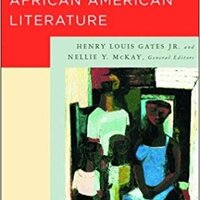 Norton Anthology of African American Literature, 2nd ed.
Norton Anthology of African American Literature, 2nd ed.
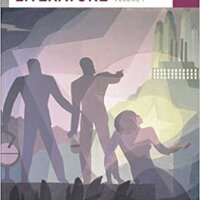 Norton Anthology of African American Literature (3rd ed.)
Norton Anthology of African American Literature (3rd ed.)
 Norton Anthology of African American Literature (3rd ed.)
Norton Anthology of African American Literature (3rd ed.) Norton Anthology of African American Literature, 2nd ed.
Norton Anthology of African American Literature, 2nd ed.